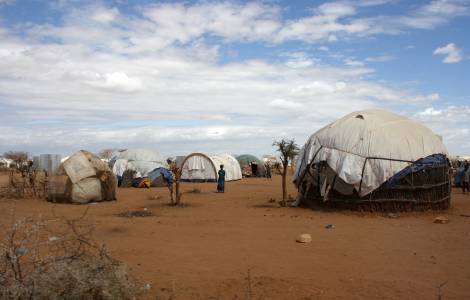
DFID/Pete Lewis
Nairobi (Agenzia Fides) - "The Government should reconsider their position and treat all refugees with care and concern especially during this period of Covid-19 pandemic when humanity is faced with serious economic and psychological challenges", says the Kenya Conference of Catholic Bishops (KCCB) by calling on the Nairobi government not to close the Kakuma and Daadab refugee camps.
In the statement, sent to Agenzia Fides, signed by His Exc. Mgr. Philip Anyolo, Archbishop of Kisumu and President of KCCB, the Kenyan Catholic Bishops have raised concern on the involuntary repatriation amidst the global pandemic. "In the Daadab camp the Somali are the majority, under the International law the refugees can return to their country once there is good governance, a democratic government that respects human rights and rule of law is in place and conditions have changed".
Due to Covid-19 pandemic, "these brothers and sisters of ours living in the camp have become more vulnerable", says the KCCB, which calls for health measures to be adopted to ensure the protection of more than 400,000 refugees housed in the Dadaab and Kakuma camps.
In their statement, KCCB recommends that Government engages in dialogue with the stakeholders to find a long lasting solution for the refugees because the situation in Kenya requires a well-detailed approach to those that need protection granted by the state in the case someone who has left their home country due to political reasons and support to those that return voluntarily.
The Kakuma refugee camp in northwestern Kenya was established in 1992.
It originally housed refugees from Sudan, joined by Ethiopians and Somalis. Dadaab, in the center-east, has long been the largest refugee camp in the world, and is actually made up of a collection of camps.
The first three camps were created in the early 1990s. Other camps were then added starting in 2011, due to the food crisis in the Horn of Africa.
In addition to Somalia, Sudan and Ethiopia, the two camps also welcome refugees from Tanzania, Uganda, South Sudan and the Democratic Republic of Congo.
Citing terrorist infiltrations into these structures in November 2016, the government of Nairobi had announced its intention to close them, without implementing the decision, already strongly contested by the bishops at that time (see Fides, 19/5/2016 and 2/7/2016).
However, on March 24 of this year, the Interior Cabinet Secretary, Fred Matiang'i, announced the government's intention to close the Dadaab and Kakuma camps, giving the United Nations High Commissioner for Refugees (UNHCR ) two weeks to present a plan to this effect.
"UNHCR is concerned about the impact this decision would have on the protection of refugees in Kenya, especially in the context of the current Covid-19 pandemic. We will continue to dialogue with the Kenyan authorities on this issue", UNHCR said.
On April 8, the High Court of Kenya temporarily suspended the government's decision to close the two structures. (L.M.) (Agenzia Fides, 14/4/2021)